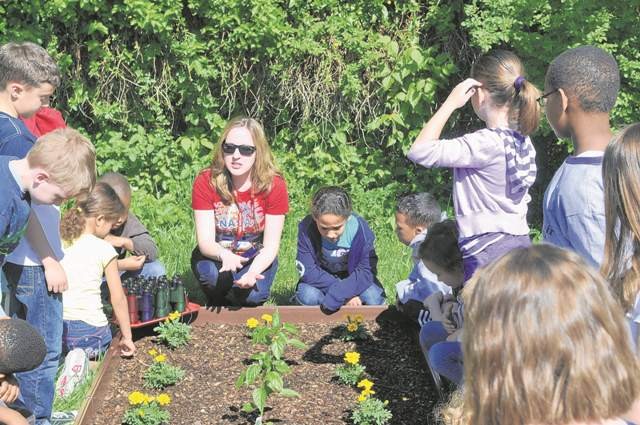FORT BELVOIR, Va. - Students at Fort Belvoir Elementary School have started an energy conservation initiative where they will take leftover fruit and vegetables from their lunches to fertilize gardens started in the back of the school.
Led by Kara Fahy, Belvoir's Science, Technology, Engineering and Math (S.T.E.M) teacher, students will grind the leftovers in a composter to make soil to fertilize the gardens.
"A lot of students at the school were really concerned about some of the energy we use as they were noticing in the cafeteria that students were throwing a lot of things away and they really wanted to recycle," said Fahy. "They can take some of the food they haven't eaten, put it in the soil, and create soil here rather then purchasing new materials."
Fahy had been talking to her students about energy conservation and did a project on recycling paper as a way to illustrate how recycling helps that process.
Fahy got the idea for an energy conservation project after learning about eCYBERMISSION while attending a National Science Teachers Association conference in Baltimore this past fall.
A free, web-based science, technology, engineering and math competition for students in grades six through nine sponsored by the United States Army, eCYBERMISSION encourages students to create a project based on something they want to improve in their community.
After some research, a group of students informed Fahy they wanted to start a composting project.
"They went through the project and we worked with them each day, and they went through the problem and what were some possible solutions," said Fahy. "So, because of that when I heard the student council wanted to also do composting that group was able to use what they did in their research project and collaborate with the (Student Council Association) students."
Chris Bridges, who is a volunteer at the school and happens to compost on her own offered to help find a composter once she learned of the initiative.
"It's a pretty small scale operation, but I thought I could at least find out what kind of composter would work better for the school," said Bridges. "So, I went to a student council meeting and looked at what the kids might be able to do with a little guidance after the adults at the school started the program, and we decided on a tumbling composter."
Clark Cares donated the gardens to the school, which Holly, Woods and Vines installed over spring break at the back of the school.
There are five gardens, growing different fruits and vegetables from red lettuce, corn, and carrots to sweet peppers, strawberries, tomatoes, sunflower, cauliflower and broccoli.
Fahy said the project is a step in teaching the students how to be more energy sufficient.
"It's just being more self sufficient as a school. Looking at energy as far as turning the lights out when you leave a room that way you aren't using as much electricity to help conserve those resources," said Fahy. "I'm really excited about it."


Social Sharing